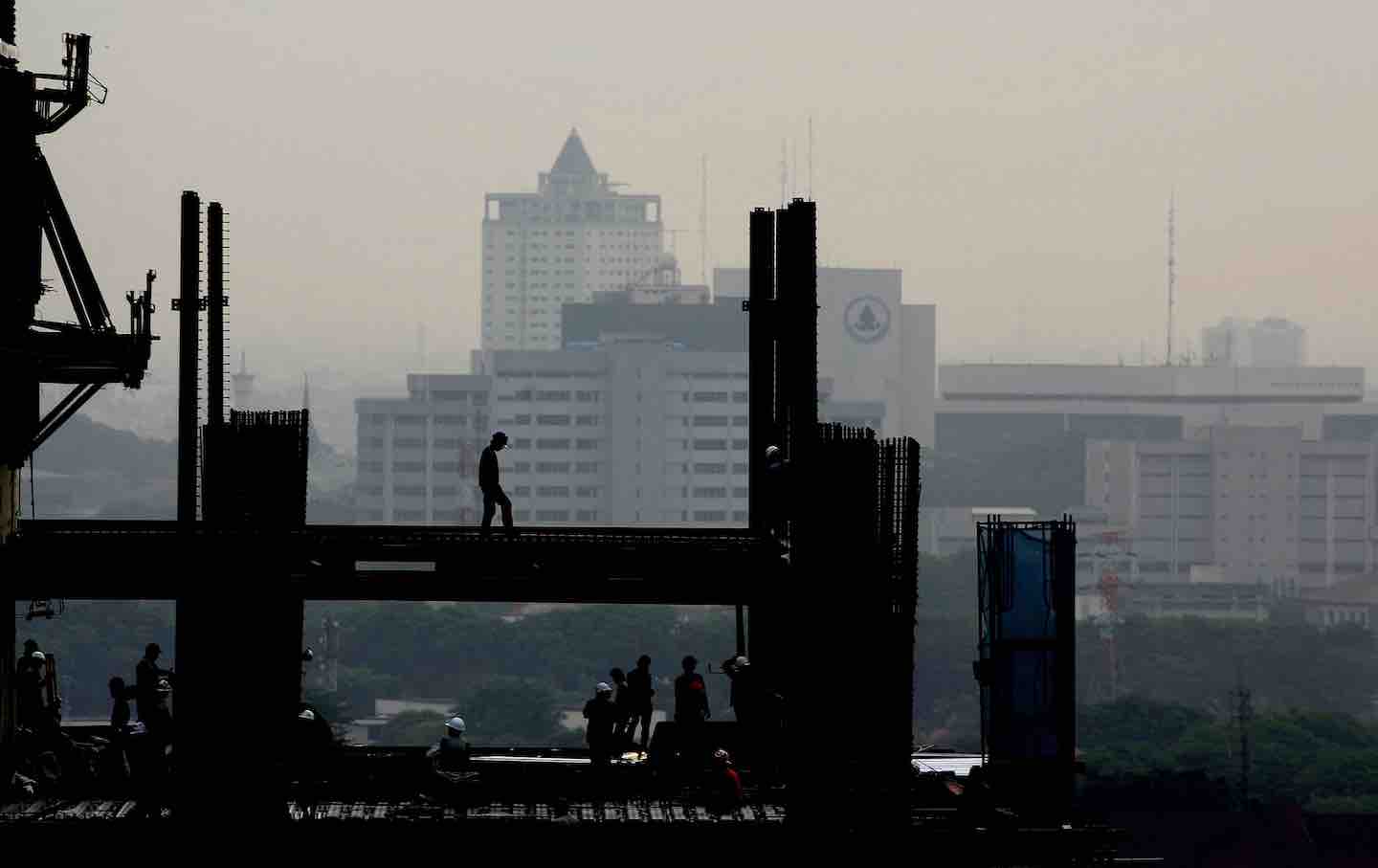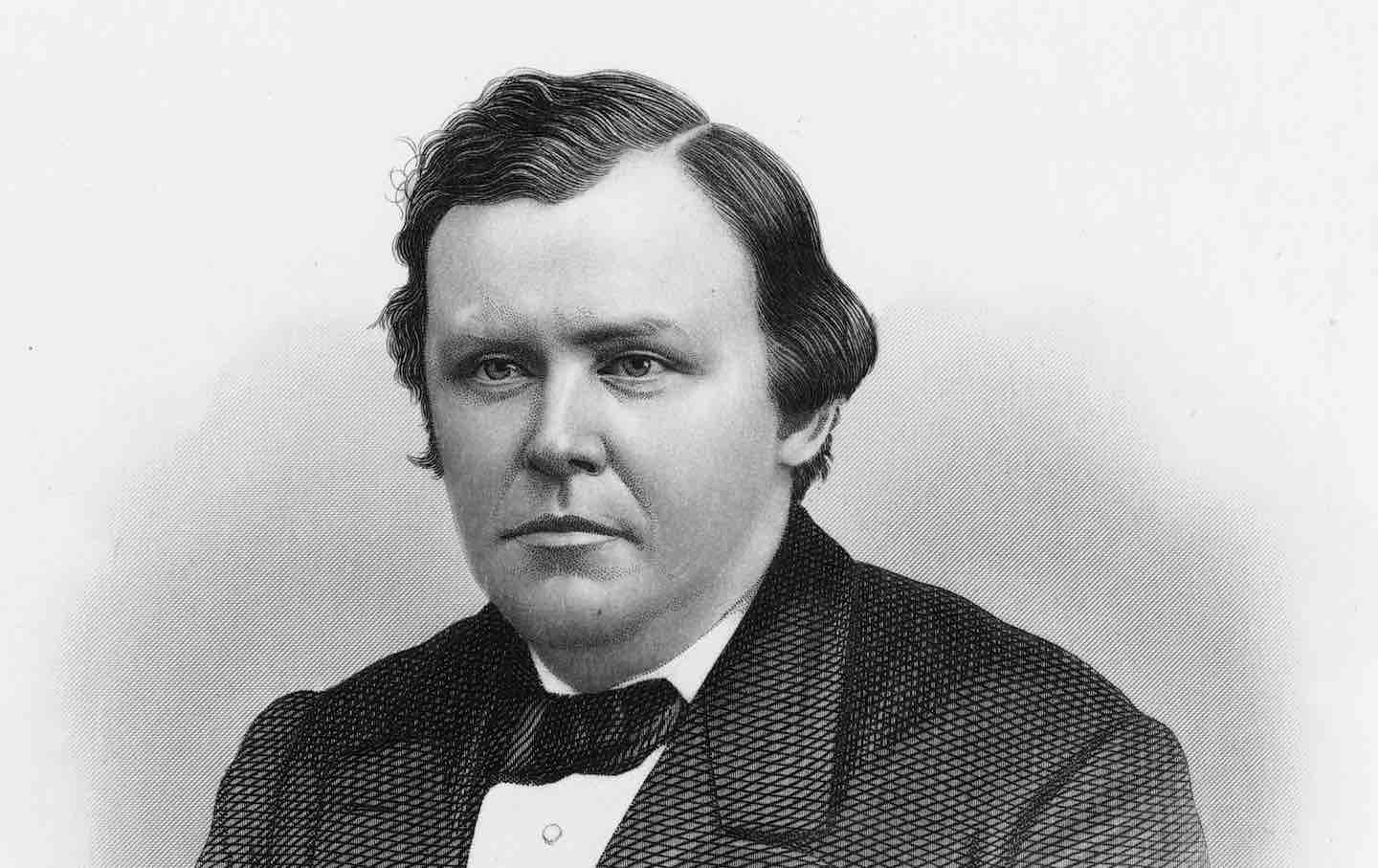Norman Erikson Pasaribu’s Portrait of Gay Indonesia
In, Happy Stories, Mostly, a collection of short stories, the complexities of queer life in the Southeast Asian country come into focus.

Happy endings (or beginnings) don’t make for good fiction, as the Indonesian writer Norman Erikson Pasaribu knows well. But Pasaribu doesn’t want to give readers sob stories either, especially about their chosen subject: queer life in Indonesia. Instead, their debut collection, Happy Stories, Mostly, is written in a playful, tragicomic tone. The 12 stories in the book document the difficulty of queer lives, especially of gay men, in modern Indonesia. The plots may be propelled by tragedy, but no one—gay or straight—is reduced to or defined by trauma. Pasaribu treats their characters like friends, to be listened to and laughed at in equal measure. Even when the stories are sad, as they often are, Pasaribu refuses to give readers a front-row seat to gay suffering.
Books in review
Happy Stories, Mostly
Buy this bookOften, heterosexuals and their hang-ups are the butt of Pasaribu’s jokes. The humor in Happy Stories, Mostly targets social conventions that make queer Indonesians’ lives difficult, while showing that the country’s conservatism makes straight people unhappy too. In one typical piece of dialogue, a straight character worries that a graphic novel about a superhero who can change anyone’s gender or sexual orientation is offensive. His gay interlocutor gives an answer that seems to channel Pasaribu’s own voice: “It’s satirical, honey. Not to mention absurdist. And the writer is trans. Humor’s her coping mechanism. Yeesh.”
Happy Stories, Mostly ranges across the Indonesian archipelago in all its ethnic and religious complexity, featuring characters who come from small towns and from lower-class backgrounds. They take public transit and live in dingy rooms, even if they have moved up a rung by migrating to the capital, Jakarta. Queer identity is layered upon many other forms of marginalization in Pasaribu’s imagined world, just as it is in today’s Indonesia.
As a gay writer from the Toba Batak minority and a Christian in a Muslim-majority country, Pasaribu has thought deeply about what it means for them to write for both queer and non-queer audiences, in Indonesia and abroad. Pasaribu’s poetry first brought them acclaim when they won a poetry competition run by the Jakarta Arts Council in 2015. The poems appeared as Sergius Seeks Bacchus from the UK publisher Tilted Axis in 2019, followed by Happy Stories, Mostly in 2021 (which was published in the US this summer). Both books have been translated by Tiffany Tsao, who finds creative ways to retain the ambiguity of Pasaribu’s sentences in Bahasa Indonesia, a language in which pronouns are not gendered. The prose isn’t showy, but the imagery is startlingly rendered in Tsao’s translation: “Bags under our eyes, black as burnt chicken skin from all the melted night-shift mascara and kohl.”
Pasaribu centers queerness while treating the happiness and interiority of their characters obliquely, by narrating from unexpected perspectives: The protagonists are often straight, supernatural, or religious—in one story, a nun; in another, a statue of Jesus that has fallen under a bed. Such diverse narratives show that queer life in Indonesia is defined as much by these other, outsider perceptions as it is by the experiences of queer people themselves. Pasaribu is interested in agency and power: If queer people are suffering, they ask, why is that so?
In “Metaxu: Jakarta, 2038,” a female narrator confesses to a priest all the sins she committed against her little brother, starting with the time she threw an empty cough syrup bottle at him, which shattered and left him partially deaf in one ear. Her other sins: laughing at her brother as he mourned their late father, who committed suicide; arranging a secular funeral for him, despite her brother’s insistence on a religious burial; lying to her brother and refusing to help him when he wanted to get a job at the karaoke parlor where she works; jeering at him when he turned up there, desperate to immerse himself in the old songs that remind them both of their dead dad. This litany of cruelties doesn’t include sneering at her brother’s crush on a boy named Ben. In her telling, she doesn’t care that her brother is gay; she was only cruel to him for doing things that awakened feelings she had tried to quash or memories of their shared past she had tried to forget.
Those memories are now all she has left: Her brother ran away, and she has never seen him again. The story concludes with the narrator—now a student of philosophy—musing about a new technology that can erase bad memories. It’s impossible, she thinks, because the past is part of her body: “I’ve already tried erasing my memories, but they keep surfacing anyway. They’re made of protein, and protein is forever.” She wants to forget how her own cruelty has left her with no one, but she can’t help but revisit what happened long ago in her confessions. Pasaribu doesn’t resolve her uncertainty; in this story and others in the collection, they suggest that sometimes we want to hold old traumas close.
Elsewhere, Happy Stories, Mostly invokes classic queer narratives such as coming out more directly. Rejection is a recurrent theme, but the most unsympathetic characters are never flattened into homophobes. Pasaribu is interested in more nuanced responses to queerness, such as hostile ambivalence and casual callousness and the harm they can cause.
Henri in “The True Story of the Story of the Giant” is a small-town boy from Sulawesi, in eastern Indonesia, who swings between self-importance and insecurity after he moves to Jakarta for university. Floundering in his history courses, he is unsettled and intrigued by his classmate Tunggul, who is as worldly and poised as a teenager can be. (He reads Ryszard Kapuściński; he has opinions about Indonesian history; he makes wry, self-deprecating jokes about having one Catholic and one Muslim parent.) Henri envies and wants to emulate Tunggul, for shallow and self-interested reasons: He wants to improve his grades and score himself a cooler girlfriend. The two boys become close friends. Eventually, Tunggul confesses his feelings for Henri, who fumbles his response and says the wrong thing. When Henri tells his cousin, who is also gay, about Tunggul, the cousin points out how hard it must be for Tunggul. Henri lashes out: What about him? “As if I have role models? Pass the phone to my dad then, please. Oh wait, you can’t!”
After the rejection, Tunggul throws himself in front of a train and dies. Henri is lost in a vortex of guilt and depression. Unsure what to do, he devotes himself to completing Tunggul’s thesis, a historical account of a Batak legend about the giant Parulian. This legend had brought the two boys, with their shared Batak heritage, together. Henri splits up with his girlfriend and wanders North Sumatra on a quixotic quest to find evidence of Parulian’s existence. Finally, after more than a year, Henri has an epiphany in a cheap motel: He cannot write the history that he’d planned, but he can write an homage to Tunggul. Through his imagination, Henri finds consolation.
As Pasaribu asked rhetorically in a conversation with their translator, Tiffany Tsao: “Can you, as a queer, be happy in the way the heteros are happy in Indonesia?” The book suggests that happiness isn’t a state that queer people can achieve on their own, especially not in a country where the rights of queer people are neither protected nor recognized by the state. Instead, happiness is always temporary and contingent, because it depends on relationships with other Indonesians, who feel uneasy when queerness brushes up against heterosexuality and its norms.
Success, both at home and abroad, hasn’t come without downsides for Pasaribu. They are arguably Indonesia’s most visible queer writer, which has attracted unwelcome attention such as online bullying, as they have discussed in interviews. Pasaribu’s stories gesture at the country’s postcolonial politics, but lightly. Sometimes they invoke pivotal historical moments or prominent figures to make a joke. (In “Welcome to the Department of Unanswered Prayers,” there is a comedic riff on the phrase “Indonesia is at a crossroads” that pokes fun at hackneyed journalese about a country that, in the eyes of the West, is in a constant state of crisis.) Pasaribu is also interested in interrogating how queer people from the Global South with few privileges can be happy against the odds. Happy Stories, Mostly shows that the well-being of queer people is just as important for Indonesia’s future as the political goals that are more visible in the public sphere.
Popular
“swipe left below to view more authors”Swipe →Pasaribu sees families as the site where queer happiness might thrive but just as often is stymied. Most of the families in Happy Stories, Mostly are broken and unconventional, but they adapt and accommodate. Still, relationships buckle, even tear, for fear of what small-minded neighbors will say. Pasaribu has a soft spot for older female characters: They self-reflect and have a chance at redemption. They are also the collection’s designated comedians. Tula, the nun in “Ad maiorem dei gloriam,” ruminates on the consequences of staying overnight with Yohannes, the gay single father she has befriended. She envisions scandal followed by catastrophe if it comes to be known that nuns are running away from her convent. (She is the second to abscond.) “The world already has enough single men; imagine what a sad state of affairs it would be if Christ joined their ranks.”
In “Our Descendants Will Be as Numerous as the Clouds in the Sky,” the penultimate story in the collection, Leo and his husband Thomas live with Leo’s mother, Mrs. Siahaan, a self-described “rational, intellectual woman” who believes she’s not homophobic even though she refused to attend her son’s wedding in the Netherlands. Although Mrs. Siahaan tolerates Thomas, she doesn’t appreciate how he performs his filial duties toward her. As Pasaribu writes:
She didn’t hate Thomas. She never had. But deep down there was some part of her that didn’t want to let Thomas enjoy himself too much. His arrival had certainly made it impossible for her to live like everyone else.
Despite her disdain for Thomas, Mrs. Siahaan has become worried that her son’s marriage to him has hit a rough patch. A few months earlier, Leo and Thomas returned from India, where a surrogate had given birth to their son, Jeremy. Mrs. Siahaan snoops for clues in Leo and Thomas’s room and finds several: a book on heart disease, a draft of Thomas’s novel, a collection of pornos, and—at last—Thomas’s diary. Riffling through it, Mrs. Siahaan deduces that Thomas is suffering from heart disease and becomes scared that he will die, leaving Leo and their newborn son alone.
The truth is worse than she imagined, though. By eavesdropping on the couple, Mrs. Siahaan learns that it is her grandson who is ill; Thomas had kept the diagnosis a secret. The two men have reached an impasse: Leo feels betrayed, while Thomas is tired of trying to please not only Leo but his mother too. It’s her fault, Thomas says, that they felt pressured into having a child. Thomas declares he’s moving out. Mrs. Siahaan can’t believe what she hears.
In her son’s life, she was nothing but the root of the problem, a whole tree of problems. Hadn’t she only ever wanted the best for him? Though, she had to admit, she sometimes felt confused. Everything in life changed so fast!
The story ends on this note, with Mrs. Siahaan’s capacity to see clearly the harm she has caused holding out the possibility that she will change. That Mrs. Siahaan, Leo, and Thomas are wealthier than all the other characters in the collection—they are educated, they travel, they live in a two-story house–suggests that certain material conditions make happiness more attainable for some queer people in Indonesia than others. Money and privilege, which allow Leo and Thomas to marry in the Netherlands and hire a surrogate in India to bear their child, can buffer some of the bigotry and pain. But even in this story, the most hopeful of the collection, Pasaribu underscores that happiness springs from the choices we make in our intimate lives.
More from The Nation

The Peculiar Case of Ignatius Donnelly The Peculiar Case of Ignatius Donnelly
The Minnesota politician presents a riddle for historians. He was a beloved populist but also a crackpot conspiracist. Were his politics tainted by his strange beliefs?

The Agony of Aaron Rodgers The Agony of Aaron Rodgers
Is he the world’s most interesting athlete or is he just a washed-up crackpot?

Can You Understand Ireland Through One Family’s Terrible Secret? Can You Understand Ireland Through One Family’s Terrible Secret?
In Missing Persons, Clair Wills's intimate story of institutionalized Irish women and children, shows how a family's history and a nation’s history run in parallel.

Peter Schjeldahl’s Pleasure Principle Peter Schjeldahl’s Pleasure Principle
His art criticism fixated on the narcissism of the entire enterprise. But over six decades, his work proved that a critic could be an artist too.

How the Western Literary Canon Made the World Worse How the Western Literary Canon Made the World Worse
A talk with Dionne Brand about her recent book, Salvage, which looks at how the classic texts of Anglo-American fiction helped abet the crimes of capitalism, colonialism, and more...

Along the Roads That Built Modern Brazil Along the Roads That Built Modern Brazil
José Henrique Bortoluci's What Is Mine tells the story of his country’s laborers, like his father, who built its infrastructure, and in turn its fractious politics.


